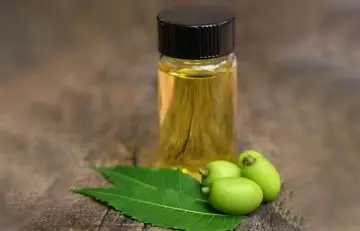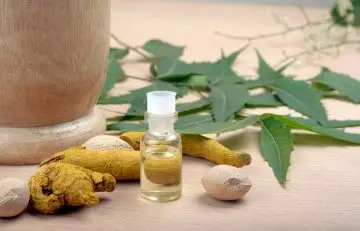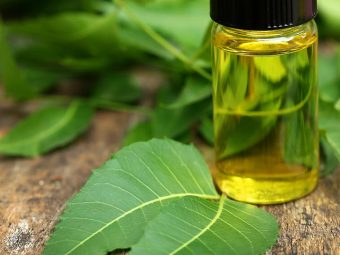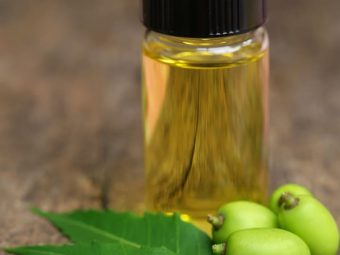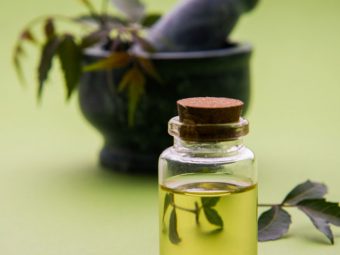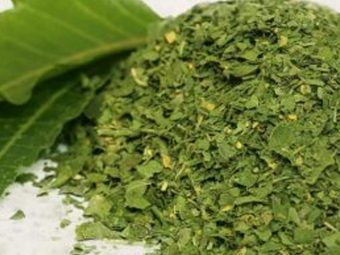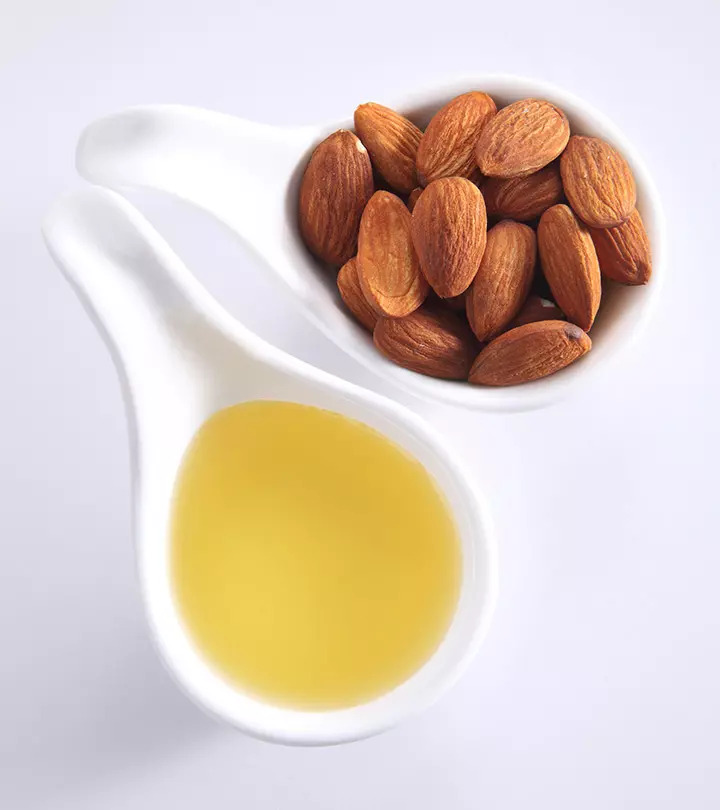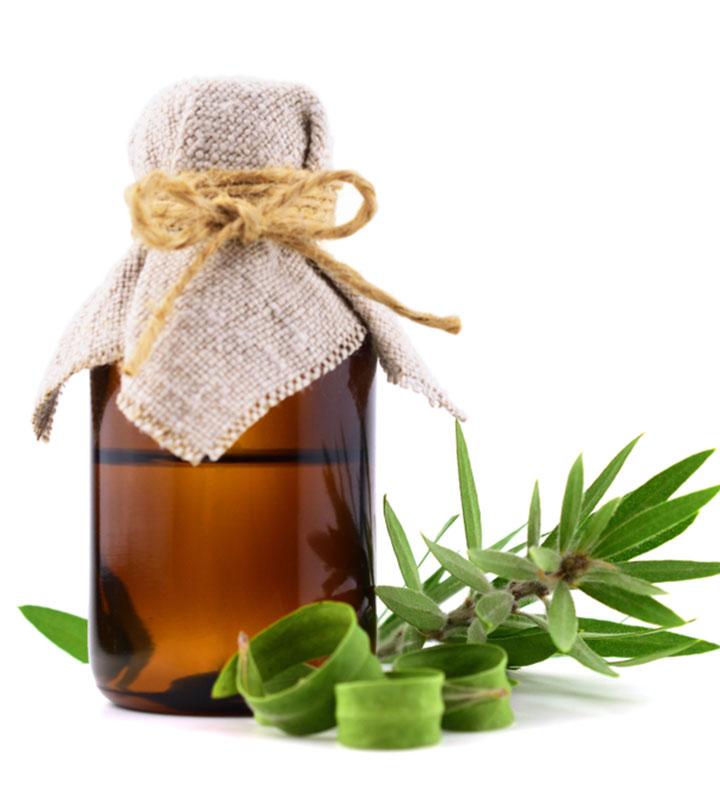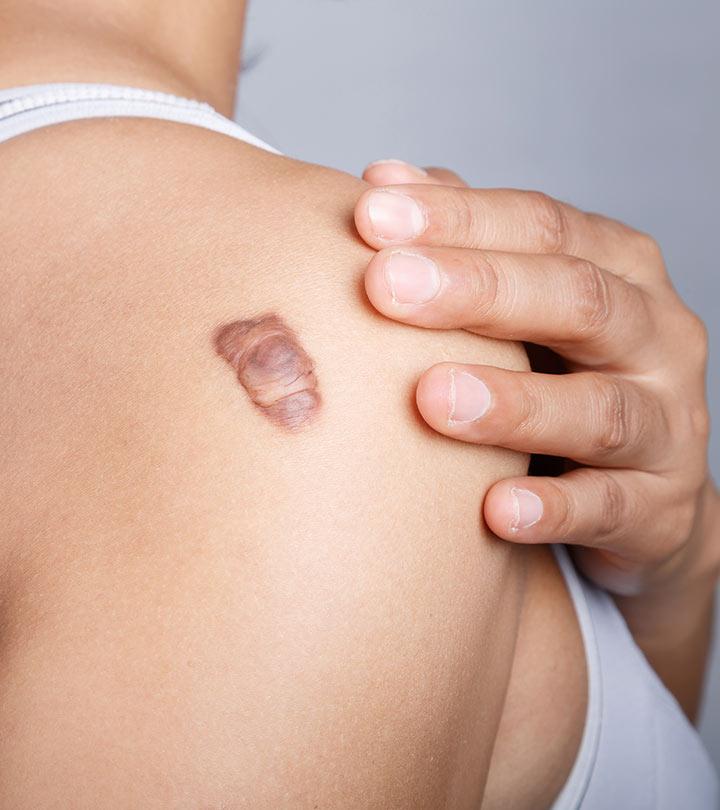Tips To Use Neem Oil For Eczema
Using this natural herb to gain some relief from itching is as easy as ABC!
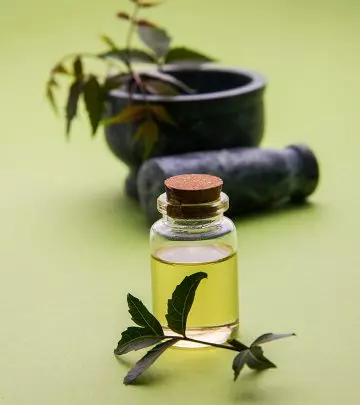
Image: Shutterstock
Neem has been a part of traditional and natural medicines for ages (1). It is known to improve the immune system and enhance overall health and wellness. In Ayurveda, this medicinal plant is considered the healer of all ailments, especially skin conditions like dermatitis, psoriasis, as well as eczema. Using neem for eczema is an effective way to manage and heal the condition and prevent flare-ups. The neem seed oil is rich in antioxidants and flavonoidsi that may soothe redness, itching, rashes, and dryness associated with eczema. Keep reading to find out how neem oil helps heal eczema symptoms.
In This Article
Neem For Eczema: What Are The Benefits And How Does It Help?
Neem oil is loaded with tanninsi XWater-soluble astringent chemical compounds that are rich in antioxidants and found in various parts of a plant, such as the bark or roots. , flavonoid derivatives, and other rich lipidsi XA group of molecules that includes fats and vitamins which function as the building blocks of living cells. that are extremely helpful in calming dryness and irritation of the skin. Even in the Siddha system of medicine (one of the oldest medicinal systems in India), neem oil and leaves were widely used for treating skin ailments (1). It not only clears infection and rejuvenates your skin but also beautifies it. Some of the benefits of neem oil are:
1. Neem Oil Is Anti-Inflammatory
Neem oil is useful in healing inflammation, which is often marked by redness, swelling, and pain. A study conducted on albino rats concluded that neem oil could relieve both chronic and acute inflammation. Neem oil also has low ulcerogenic potential (i.e., it doesn’t cause ulcers). This is why the study concluded that it is safe to use neem oil for treating inflammation (2).
2. Neem Oil Is Antibacterial
Neem oil is very useful in treating bacterial infection caused by Staphylococcus aureus, the same bacteria that aggravates eczema. A study published in the Journal of Ethnopharmacology tested neem extracts on Staphylococcus aureus and Schistosoma mansoni worms (a type of parasitic worm). It found that neem extracts inhibited the growth of both the strains of bacteria (3).
3. It Has Antihistamine Properties
An allergic reaction to any substance, be it pollen or detergents, can trigger eczema. However, neem oil – along with the extracts of other parts of the neem tree – has antihistamine properties (4). This means that it can inhibit these allergic reactions effectively.
4. Neem Is An Analgesic
Neem oil is an excellent analgesic. Over the course of several trials, neem oil has proven to reduce pain caused by soreness and wounds and foster quick healing (5), (6).
What Is Eczema?
Eczema is an inflammatory condition that produces symptoms like dry, flaky, and cracked skin, intense itching, and swelling. Although it is a chronic condition that cannot be cured, you can manage its symptoms and avoid flare-ups with the help of neem oil. Here are a few ways you can use neem oil to treat the symptoms of eczema.
How To Use Neem Oil For Eczema
- Neem And Turmeric
- Neem And Coconut Oils
- Neem Water Bath
- Neem And Raw Papaya
- Neem And Tulsi
- Neem Oil Balm
1. Neem And Turmeric
You Will Need
- 1 tablespoon neem powder (dry the leaves under the sun and then crush them)
- 3-4 drops neem oil
- 1 teaspoon turmeric powder
- 1 teaspoon raw honey
What To Do
- Combine all the ingredients in a bowl.
- Apply the paste to the affected area.
- Let it dry for 20 minutes before washing it off.
- Use until the symptoms have reduced.
Why Does It Work?
Both neem and turmeric are known for their antibacterial, antifungal, and antiviral properties. The healing touch of neem and turmeric reduces the itching while honey keeps your skin moisturized, helping in reducing the symptoms of eczema.
 Quick Tip
Quick Tip2. Neem And Coconut Oils
You Will Need
- 1 tablespoon unrefined coconut oil
- 3-4 drops neem oil
What To Do
- Mix the two oils and apply to the affected area.
- Leave it on overnight and wash it off the next day.
- Repeat until the inflammation is gone.
Why Does It Work?
Coconut oil is antifungal and antibacterial. Compared to other oils, it can penetrate your skin much more easily and keep it moisturized. When combined, both the oils help in reducing the symptoms of eczema.
 Quick Tip
Quick Tip3. Neem Water Bath

You Will Need
- 10 drops neem oil
- A handful of neem leaves
What To Do
- Boil the neem leaves and strain the water (i.e., the neem extract) into a bowl.
- Pour the neem extract and neem oil in your bathtub filled with water.
- Soak in the medicated water for at least 20 minutes.
- Follow up with a neem-based moisturizer.
Why Does It Work?
Taking a bath has a hydrating effect on your skin (which is very important for managing eczema). Adding neem to your bath water increases its moisturizing effect. However, make sure that the water is not hot. Try to take a shower in cold or lukewarm water as it won’t dry out your skin further. And always follow up with a moisturizing cream or lotion to lock the moisture in.
4. Neem And Raw Papaya
You Will Need
- 1 tablespoon papaya pulp
- 3-4 drops neem oil
What To Do
- Mix both the ingredients and apply the paste on the affected area.
- Leave it to dry for at least 20 minutes.
- Wash off.
- Repeat until the symptoms are gone.
Why Does It Work?
Both neem oil and papaya have anti-inflammatory properties that help in soothing the symptoms of eczema. Raw papaya helps in reducing itching and redness while neem oil helps in clearing the infection and inflammation.
5. Neem And Tulsi
You Will Need
- 1 cup neem leaves
- 1 cup tulsi (basil) leaves
- Water
- 10 drops neem oil
What To Do
- Boil the neem and basil leaves in water until
- the quantity of water has reduced to half.
- Strain the extract and add neem oil to it. Store it in a bottle
- Use a cotton pad to apply it on the affected area.
- Leave it on overnight (or as long as possible).
- Reapply several times a day and continue until the symptoms have reduced.
Why Does It Work?
Both neem and tulsi have anti-inflammatory and antibacterial properties that help in healing the symptoms of eczema. They reduce the itching, inflammation, redness, pain, and swelling caused by eczema.
6. Neem Oil Balm
You Will Need
- 2 tablespoons shea butter
- 1 tablespoon almond oil
- 1 tablespoon beeswax
- 1 ½ teaspoons neem oil
- 2 vitamin E capsules
- 5 drops lavender essential oil
- 5 drops tea tree oil
- A glass container to store the balm
What To Do
- Melt the shea butter, beeswax, and almond oil in a double boiler on low flame.
- Let it cool before squeezing vitamin E oil from the capsules into it.
- Add the neem, lavender, and tea tree oils and combine well.
- Pour the mixture into the glass container and let it set.
- Once set, put it in the refrigerator for 20 minutes.
- Scoop a bit of the balm and apply to the affected area.
- Apply after you have taken a shower.
- Reapply whenever needed.
Why Does It Work?
This balm is extremely hydrating and feels soothing on the skin. Its anti-inflammatory property helps in relieving the itching caused by eczema and suppresses other symptoms too.
Do not apply neem oil directly on the eczema-afflicted area and expect it to heal overnight. On the contrary, neem oil is quite potent and can make things worse.
Infographic: 5 Ways To Use Neem Oil For Eczema
Neem has anti-inflammatory, antibacterial, antihistamine, and analgesic properties, making it one of the most popularly used natural remedies for treating many ailments. Its extracts, especially neem oil, can help manage eczema symptoms and reduce inflammation. Check out the infographic below to learn more about the easiest ways to use neem oil for eczema.

Illustration: StyleCraze Design Team
Neem is a medicinal herb and is known for its anti-inflammatory, antihistamine, and antibacterial properties. People have been using neem as a herbal treatment for eczema for a long time, and it finds a prominent place in Ayurveda. Neem extracts help soothe the symptoms of eczema and may reduce dryness, and itching caused by this condition. It may aid in improving the skin texture and healing the wounds. If you have eczema, you may apply neem along with turmeric, tulsi, or coconut oil to the affected area. However, it is best to consult a doctor before using any home remedy.
Frequently Asked Questions
Is neem good for sensitive skin?
Neem oil is both harmless and incredibly effective. Unfortunately, it may induce an allergic reaction in people with sensitive skin or skin disorders. Hence, do a patch test of neem oil on your face if you are about to use it for the first time.
Does neem have side effects?
The use of diluted neem oil on the skin is generally thought to be harmless. However, individuals with sensitive skin are more prone to experience itching and discomfort.
Can you use neem oil for skin care?
Yes, neem oil can be used for skin care. It has antibacterial and anti-inflammatory properties that make it one of the most effective solutions to treat acne and inflammation.
Can I apply neem daily?
Yes, you may apply neem oil daily. However, ensure you mix it with a few drops of water before applying it on the affected area to avoid adverse reactions.
Can we apply neem paste on private parts?
Yes. Neem paste can be applied on private parts. It may help treat fungal infections like candida (7).
Can neem worsen eczema symptoms in some cases?
There is insufficient evidence to suggest that the neem worsens eczema symptoms. However, you may develop rashes and hives if you are allergic to neem.
Key Takeaways
- The bioactive compounds in neem oil may help treat the intense itching and swelling that come with eczema.
- You can use neem oil with turmeric and raw honey to relieve inflammation and moisturize irritated skin.
- You can also use natural ingredients like coconut oil, raw papaya, and tulsi with neem oil to ease the symptoms of eczema.
- When using neem oil on eczema-afflicted skin, make sure to dilute it because it is highly potent in its undiluted form.
Explore the benefits of neem in managing skin diseases through Ayurveda. This video sheds light on this ancient remedy, revealing how it can help you achieve healthier skin.
References
Articles on StyleCraze are backed by verified information from peer-reviewed and academic research papers, reputed organizations, research institutions, and medical associations to ensure accuracy and relevance. Read our editorial policy to learn more.
- Neem (Azadirachta indica): Prehistory to contemporary medicinal uses to humankind
https://www.ncbi.nlm.nih.gov/pmc/articles/PMC3695574/ - Anti Inflammatory Effect of Azadirachta Indica (Neem) In Albino Rats-An Experimental Study
http://www.iosrphr.org/papers/v4i01/E04010034038.pdf - Effect of neem (Azadirachta indica A. Juss) leaf extract on resistant Staphylococcus aureus biofilm formation and Schistosoma mansoni worms
https://pubmed.ncbi.nlm.nih.gov/26408045/ - An overview of Neem (Azadirachta indica) and its potential impact on health
https://www.sciencedirect.com/science/article/pii/S1756464620303959 - Neem: A Tree For Solving Global Problems.
https://www.ncbi.nlm.nih.gov/books/NBK234637/ - Analgesic effect of neem (Azadirachta indica) seed oil on albino rats
https://www.researchgate.net/publication/288429933_Analgesic_effect_of_neem_Azadirachta_indica_seed_oil_on_albino_rats - Efficacy of Neem Extract and Three Antimicrobial Agents Incorporated into Tissue Conditioner in Inhibiting the Growth of C. Albicans and S. Mutans
https://www.ncbi.nlm.nih.gov/pmc/articles/PMC5483820/





